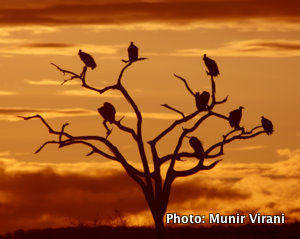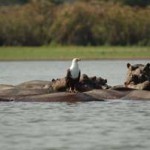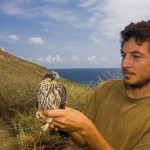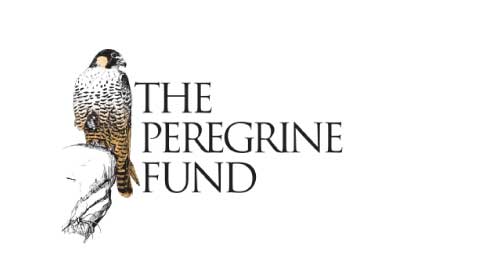Ecological implications of vulture extinction on scavengers and disease transmission Darcy Ogada

Reports of vulture declines have been numerous over the past decade. From southeast Asia to West Africa, vultures are declining at alarming rates, making them the most threatened functional group of birds. Due to their huge ranges, even relatively pristine areas in Kenya have seen large declines in vulture numbers.
Scavengers, especially vultures, provide one of the most important yet under-appreciated ecosystem services of any avian group. Because they feed by scavenging, vultures are highly specialized to rapidly dispose of large carcasses, thus playing a critical role in nutrient cycling, leading other scavengers to carcasses and reducing the risk of contamination by pathogens by quickly consuming decomposing carcasses. Despite the rate at which vultures are declining, little is known about the potential consequences of the widespread disappearance of these scavenging birds on other scavengers and rates of disease transmission at carcasses.
Vultures are considered ‘keystone’ scavengers, and may therefore play an important role in ‘who’ comes to carcasses and the amount of interactions they have. In African savannas, apart from small predatory species such as mongoose and genets, these might include jackals, lions and hyenas. But these types of non-specialist scavengers may not scavenge randomly but on those carcasses where specialists, i.e. vultures, are present in part because the aerial movements of vultures often lead other scavengers to carcasses. Therefore, vulture extinction may lead to a decline in the diversity of species scavenging at carcasses.

Although vulture declines might decrease overall diversity, certain species may benefit. In India, small predators that have benefited from the absence of vultures (e.g. rats, feral dogs) have short lives, high reproductive potential and are important disease reservoirs. Although rats and dogs are well known disease reservoirs, pathogens such as rabies and canine distemper virus can infect and be transmitted by a wide range of host species including mongooses and jackals, whose numbers may increase at carcasses if vultures become extinct in African savannas. Therefore, an increase in scavengers at carcasses could increase rates of disease transmission. This could happen as a result of higher numbers of scavengers that are good disease reservoirs (e.g. rodents, small carnivores) visiting the carcass. Since carcasses may persist longer and there are a higher number of disease reservoirs visiting the carcass, opportunities for disease transmission may increase due to more contact between scavengers.
This study will investigate the implications of vulture extinction on other scavengers and on rates of disease transmission. Specifically, I will test the following hypotheses: 1) Carcasses decompose more slowly in the absence of vultures. This has yet to be shown, but it underlies many of the assumptions of the effects of vulture declines. 2) The abundance of other scavengers will increase and they will spend more time in proximity to carcasses because of decreased competition. The lack of facilitation by vultures to find carcasses will result in a slower rate at which scavengers locate carcasses. Overall species diversity at carcasses will decrease. 3) One consequence of vulture extinction may be increased disease transmission and this can be measured indirectly through contact rates amongst scavengers at carcasses.
This work has been funded by grants from the following organizations. The Smithsonian Institution, The Peregrine Fund, The Raptor Research Foundation and the Leslie Brown Memorial Grant




I’m amazed that this is the first important study on the disease transmission issue that has shown in my searches. Much like the garbagemen’s strike in New York City years ago the loss of one of natures most important cleaners might prove to be the worst ecological disaster of the century. People are quick to complain about the decline of Polor Bears and whales but few seem to see just how serious this problem is. Disease has killed more people worldwide than all wars combined.
Very good article to know the importance of Vultures in our environment. Very simple to understand. Thnx.
I am very glad to read about how important are these scarvengers in our ecosystem. I hope l will see to it that they are protected and loved by the people. I need to know more about them. We need to have the books in our libraries which teaches our young generation about the importance of nature in our enviroment.